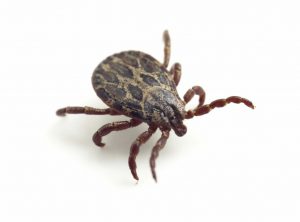 Ticks are a very small insect that’s capable of creating a lot of problems for whatever it decides to latch onto. And because of their size they’re often difficult to spot. And worst of all is the fact that ticks are known carriers of several serious diseases, such as Babeosis, Rocky Mountain spotted fever and Lyme Disease. Luckily, with a bit of information and foresight there are a number of things you can do to mitigate the amount of damage a tick can cause--as well as prevent encounters with them all together.
Ticks are a very small insect that’s capable of creating a lot of problems for whatever it decides to latch onto. And because of their size they’re often difficult to spot. And worst of all is the fact that ticks are known carriers of several serious diseases, such as Babeosis, Rocky Mountain spotted fever and Lyme Disease. Luckily, with a bit of information and foresight there are a number of things you can do to mitigate the amount of damage a tick can cause--as well as prevent encounters with them all together.
Getting To Know Ticks
It helps to have some basic understanding of ticks and their behavior in order to guard against them. Ticks are small--about the size of a sesame seed, which means you’ll likely not be able to spot them out in the wild. They feed on blood and they"re most active between March and May and then between August and November. In order to find prey, ticks will use a tactic known as questing. Questing is when a tick will wait on the end of a blade of grass until something or someone brushes against it. Once this happens the tick can either begin feeding immediately or crawl up its victim’s body until it finds a spot to latch onto. Being mindful of the fact that ticks can be everywhere is the first step in protecting yourself from them.
Watch Where You Step
While outside ticks can be everywhere but there are places that they’re more likely to inhabit than others. So while walking avoid tall grass or piles of leaves. And if you plan on being outside for a long time it’s a good idea to apply ample amounts of bug spray to exposed skin. It’s also a good idea to wear long pants and tuck them into socks, but remember that ticks can climb until they find a way to your skin. If you regularly spend a large amount of time outside, it may even be worthwhile to invest in insect repellent clothing.
Stay Vigilant
Despite whatever precautions you take there’s always a chance a tick may find a way past your defenses. That’s why it’s important to set up regular tick check routines for you and your pets. Spotting a tick quickly can make all the difference in preventing it from transferring a disease. You also have to be very careful as to how you remove a tick. The best way to do so is with a pair of metal forceps. Grip the tick as close to the skin as possible and pull it straight out--being sure not to break it apart or leave any of its mouthparts behind. Do not cover it with any liquids, creams or try to burn it away. Quickly and properly removing a tick will lessen the time it has to transfer diseases. Once the tick is removed you should save the body if possible and have it tested for any diseases to know if you should seek treatment.
Ticks are dangerous pests and it’s best to avoid them. This can be easier said than done however. That’s why Mosquito Tek offers flea and tick control services. We’ll inspect your home and property for them and completely eliminate them if they are present.
Learn more about flea and tick extermination: https://virginia-beach.mosquitofreeliving.com/services/flea-tick-control/
Comments
Post a Comment